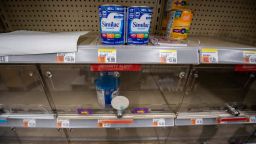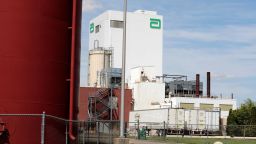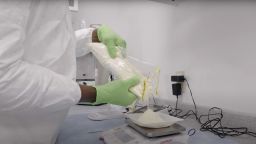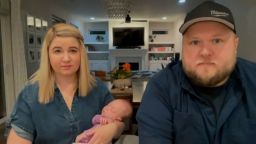Every day, Hillary Demmon has been reading the news about the nationwide formula shortage with horror.
“It’s just such a nightmare scenario to think about,” said Demmon, who has a 1-year-old and who works at the University of Pittsburgh.
For the week ending May 22, almost three-quarters of formula products nationwide were out of stock at some point, up from 45% the week before and about 5% at this point last year, according to numbers that Datasembly shared with CNN.
Sympathetic to moms who must now go from store to store in search of food for their hungry babies, Demmon decided she couldn’t just read about it, she could do something about it.
“I realized I have a deep freeze full of milk, and I’m still pumping,” Demmon said.
She decided to start pumping exclusively so she could donate to a local milk bank.
“I figured this is something that I can tangibly do in this nightmare timeline we are living in right now to concretely help some other families,” she said.
Lactation experts across the country have heard from an increasing number of mothers who want to donate extra breast milk.
Much like with donating blood, a person can safely donate to milk banks set up around the world that, for decades, have helped infants who would otherwise have no or limited access to human milk.
“Milk banks are in dire need because there’s so many premature formulas that are not available for sick infants,” said Dr. Sheela Rath Geraghty, medical director of the Breastfeeding Medicine Clinic at Cincinnati Children’s. “We are asking every mother with extra milk to please donate it to a humanmilk bank.”
Milk banks have come a long way since the first one opened in the United States in the early 1900s at the Boston Floating Hospital. In addition to collecting human milk, the banks now screen, process and distribute it. Much of the limited supply goes to premature babies.
Although human milk is beneficial for all babies, it can be of particular help to the 10% of infants in the US who are born prematurely and are susceptible to conditions like necrotizing enterocolitis, a potentially life-threatening intestinal disorder.
The screening part of the process is key, Rath Geraghty said.
“No woman should ever attempt to give milk directly to another woman’s baby,” she said.
In a 2017 policy statement, the American Academy of Pediatrics advised against using internet-based or informal human milk sharing because the milk can expose a baby to bacteria, viruses or harmful substances.
The US Food and Drug Administration also recommends that a parent use milk only from a source that has screened its donors and taken other precautions to make sure the milk is safe.
Demmon is now going through the screening process. She had an interview to discuss her health and the medicines and supplements she’s taking. The milk bank will get in touch with her OB/GYN and her child’s pediatrician for additional screening. There’s a blood test and an initial donation of 50 to 100 ounces of milk. The Mid-Atlantic Mothers’ Milk Bank will run further tests to make sure there’s nothing in the milk that could put a medically fragile infant at risk.
“As long as everything’s good at that point, then I can start doing my ongoing donation,” Demmon said.
Milk banks will often will pool milk from multiple donors or milk from an individual donor that has been given over time. The milk will usually be pasteurized and put in small containers that can be frozen for up to a year.
Demmon, a filmmaker and professor at Pitt Film & Media Studies, said the bank told her it can take her milk until her baby is 1? years old. That means she will pump to donate her milk for the next six months.
“I was lucky enough to be able to establish breastfeeding and how to work with my work schedule,” she said. “That’s really [a] tough situation, not being able to feed your baby.”
There are larger efforts to ease some of the shortage. The Biden administration’s Operation Fly Formula has brought in tons of product to the US, and foreign formula manufacturers say they will have more to share.
Australian company Bubs plans to send 1.25 million cans to the US, some of which is ready to transport. Danone is bringing in half a million cans of its specialty Neocate formula by the end of June, with the hope that families will get access to it in early July. Nestle said 40% of the Gerber formula that arrived in the US on Wednesday was going to be shipped to retail stores by Sunday night.
The administration has also worked with formula manufacturers to speed up production, and the crucial Abbott plant that has been offline since February is expected to restart production this week.
But many grocery store shelves are empty, and donor moms are still needed.
Marie Millan of Medford, Oregon, shared Demmon’s sympathy for parents who are having a hard time finding formula.
Millan’s gone through the screening process and has started to donate her breast milk.
“I’m a nurse. I work for one of the two local hospitals. So it’s easy for me to donate. I can just bring it to work with me,” she said.
Millan, who has a 6-month-old, said she felt “called” to donate when she saw so many parents unable to find formula.
“When you’re a mom that’s already naturally second-guessing everything you’re doing, you know, wondering, is this the right thing? You’ve made the decision to formula feed for whatever reason – any reason is valid – and then suddenly, you can’t find formula. I just can’t imagine. It must be so tough,” Millan said.
“I can’t make formula. I can’t buy it up from the store. But I can donate breast milk, and so I definitely feel like I have an obligation to do that.”
Millan said she’s fortunate to produce a lot of milk. In addition to breastfeeding her daughter, she pumps at work twice a day and gets twice as much as her baby needs.
Get CNN Health's weekly newsletter
Sign up here to get The Results Are In with Dr. Sanjay Gupta every Tuesday from the CNN Health team.
“My freezer is just full of breast milk,” Millan said.
Like many mothers, she feels a real camaraderie with other moms.
“I can only imagine how hard it would be to worry about feeding my child,” Millan said. “It definitely feels like now is the time to help other moms in my community.”
Correction: A previous version of this story incorrectly spelled Marie Millan’s name and the name of the town where she lives, Medford, Oregon.
CNN’s Elizabeth Cohen, Danielle Herman and Nadia Kounang contributed to this report.






